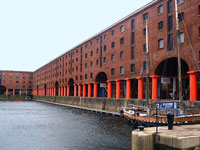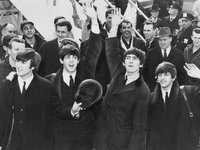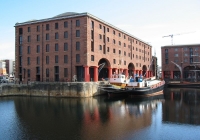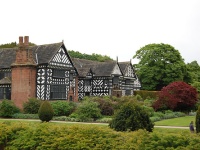City guides


Liverpool Travel Guide
Whether they take the ferry cross the Mersey or a stroll down Penny Lane, most visitors will find it difficult to explore Liverpool without a song on their lips. From the Twin Cathedrals with their striking views over the city to the historical, Grade 1-listed Albert Dock and its Beatles museum, there's certainly plenty to see and do in Liverpool. Famous for football, music and shipping, Liverpool has steadily increased in popularity with tourists over the last decade.
An important maritime centre and industrial port, Liverpool was one of the great cities of the United Kingdom during the Industrial Revolution, and much of its wealth came from its dominance in the shipping of textiles, cotton, sugar, and slaves.
The city was severely bombed in World War II and has struggled to get back on its feet, experiencing alternating waves of prosperity and depression. The 1960s saw the explosion of the Beatles and pop music, while the 1990s saw an attempt to regenerate the urban centre.
Liverpool's waterfront is now a UNESCO World Heritage Site, and the city has achieved World Heritage Status, joining Edinburgh and Bath as the only UK cities to carry the honour. Millions of pounds were poured into the development of the city when Liverpool was announced as the European Capital of Culture for 2008, including the £920 million Paradise Street development in the city centre.
Things to do in Liverpool
Liverpool is a city of diversity that boasts the greatest amount of Georgian buildings in the UK, Europe's oldest Chinatown, a number of striking Victorian structures, and plenty of world-class tourist attractions.
The historical Albert Dock was restored in the 1980s and is now one of the city's most popular attractions, housing chic restaurants, bars, shops, and museums, including the Merseyside Maritime Museum and the Tate Liverpool.
The city boasts two famous football clubs, Liverpool and Everton, and fans can explore the grounds of their favourite teams on guided tours. There is also plenty of Beatlemania to satisfy fans, including the International Beatles Week every August, and several Beatles-related museums and points of interest.
The city plays host to plenty of other events, festivals and concerts, as well as the world's biggest steeplechase in the form of the Grand National, held at Aintree. There are also several fascinating museums, beautiful parks and gardens, bustling markets, and galleries to explore. Whether a Beatles fan or not, Liverpool has much to offer travellers, and it is no wonder that it has become one of the top UK daytrip destinations in recent years.

Tate Liverpool
The Tate Liverpool is home to the biggest collection of modern art in the UK outside of London, and a browse through its galleries is always an afternoon well spent. Situated in Liverpool's historic Albert Dock in a converted warehouse, the gallery has an impressive collection of 20th and 21st century works of modern art, selected from the Tate Collection, and exhibited through regularly changing, themed displays. There are also several temporary exhibitions of contemporary art and the gallery hosts various events and educational programmes throughout the year. Some of the artists on display include JMW Turner, Kenneth Noland, Henri Matisse, Paul Gauguin, and Antony Gormley.

Beatles Story Experience
For Beatles fans, The Beatles Story Experience is an absolute must. Set in the trendy and historic Albert Dock building, The Beatles Story allows visitors to trace the development of the Fab Four, from their early days playing in Hamburg to the mass hysteria of Beatlemania, from the eventual break-up of the band to their ensuing solo careers. Eighteen different features, as well as the Living History audio tour with the voices of Sir Paul McCartney, Beatles producer Sir George Martin, and band manager Brian Epstein, continue to delight fans and win over new ones. Visitors can see George Harrison's first guitar, view the world through a collection of John Lennon's signature round lens glasses, explore the Yellow Submarine, and enjoy a recreation of the stage at the Cavern Club on Mathew Street, where The Beatles played over 290 times. As well as the Beatle Story Experience, Liverpool also boasts several other Beatles-related tours and sights that are well worth exploring, including a Magical Mystery Bus Tour of famous Beatles sights such as Penny Lane and Strawberry Fields, Paul McCartney's former home at 20 Forthlin Road, the famous Cavern Club, and the Mathew Street Gallery that houses the art work of John Lennon.

Merseyside Maritime Museum
The fascinating Merseyside Maritime Museum traces the history and development of the city of Liverpool as a major port. The museum houses a range of collections, from an exhibition on the tragic and brutal transatlantic slave trade (in which Liverpool played a major role), to artworks reflecting Liverpool's maritime past, artefacts from the Titanic and the Lusitania, maritime archives and more. Visitors also gain access to the quaysides opposite the museum, and to two historic vessels. A worthwhile sight, budget at least two hours to experience it properly. There is no admission fee and the whole family should enjoy the experience.

Speke Hall
On the edge of an industrial estate and just minutes away from the Liverpool Airport, the half-timbered black and white Speke Hall is a piece of history tucked in among modern-day Liverpool. Once on the brink of ruin, this purportedly haunted 450-year-old Tudor house is now a popular Liverpool attraction, and is also the departure point for tours to the neighbouring former home of Sir Paul McCartney. Speke Hall boasts beautifully restored rooms, lovely gardens, and spectacular views of the Mersey basin and the North Wales Hills across the high bank of The Bund. Speke Hall is also a popular venue for events such as weddings and it plays host to various concerts, particularly over the summer. Guided tours by costumed guides are available, and tours of the roof space are also available on selected days. The Home Farm is about five minutes from the house and has a visitor's centre, a shop, and a good restaurant.
Getting Around
Liverpool is pedestrian-friendly, and visitors can enjoy many of the city's sights and sounds on foot, but taxis, buses, and trains are also readily available. An underground system operates between the city's four main train stations.
The Live Smart ticket, which can be bought online, offers free travel on two major bus lines as well as discounted entries into various attractions and is a good purchase for tourists. The city is relatively easy to negotiate by car, and there are several car rental agencies available.
A great way to explore the city and its surrounds at a leisurely pace is on the Mersey Ferry. A regular service links Liverpool's Pier Head to neighbouring Birkenhead on the Wirral. Uber and similar mobile app based taxi services are available.
Liverpool Climate and Weather
Liverpool's climate is typical of the United Kingdom; fairly mild yet highly unpredictable with a mixture of rainy, sunny, windy and cloudy days all year round. Summers, between June and August, are usually warm and sunny, while winters, between December and February, are cold and wet. Temperatures average around 68F (20C) in summer and 39F (4C) in winter. As with most of the UK, the most popular time to visit Liverpool is in late-spring and summer, although early-autumn can also be pleasant.
United Kingdom travel info
Electricity
The electrical current in the UK is 240 volts, 50Hz. Flat, three-pin plugs are standard.
Language
English is the official language, though visitors will be astonished by the variety of regional accents.
Money
The currency is the British pound (GBP), which is divided into 100 pence. ATMs are available in almost all towns and Visa, MasterCard and American Express are widely accepted. Foreign currency can be exchanged at bureaux de change and large hotels, though better exchange rates are likely to be found at banks.
Tipping
Tips of 10 to 15 percent are expected in restaurants and upmarket hotels in the UK if a service charge hasn't been included. Hotel service staff receive an optional amount, while taxi drivers are usually given 10 to 15 percent of the fare. Tipping bartenders isn't expected, and tipping for other services is discretionary.
Health
There are no specific health risks associated with travel to the UK and food and water can be considered safe. The British National Health Service is excellent, and a number of countries have reciprocal health agreements with the UK including Australia, New Zealand and EU countries. Visitors from other countries such as Canada, South Africa and the United States are advised to take out comprehensive travel insurance.
Safety
It's generally safe to travel throughout the UK.
Local customs
Handshaking is customary when introduced to someone new. Smoking is banned in all enclosed public spaces, including pubs, restaurants and public transport. Queue barging is frowned upon and there is strict etiquette on escalators: stand on the right, walk on the left. Visitors may find Londoners more rushed and less friendly than locals in other parts of the country, particularly on London transport, where tourists are often the only people who talk.
Doing business
The four countries of the United Kingdom, although culturally and historically different, generally keep to the same business practices. Politeness and punctuality are key to good business relations and initial meetings are often conducted formally and impersonally, becoming more open and social as things progress. Business cards are exchanged at introductions, and dress is formal with dark suits preferred. Business hours are generally 8am to 5pm Monday to Friday with an hour taken at lunch.
The communication style can be difficult to adjust to: the British people respect politeness to a point that often obscures their ability to say exactly what they mean. As a result, travelling business people may need to learn to 'read between the lines' and to take cues from tone of voice and facial expression. Humour is also an integral part of the British system of communication, and is used to diffuse a tense situation and to cultivate relationships. Foreigners should never assume that an attempt at humour undermines a person's ability to do their job, or discredits the importance they attach to a deal or negotiation. Furthermore, they shouldn't be fooled into thinking that the British propensity for irony and sarcasm equates with an informal work environment.
Foreigners should be tactful during meetings, avoid becoming emotional and illustrate their experience with the subject at hand. Performance and initiative are looked upon favourably, whereas academic pretension is given far less credence. Meetings are often used as platforms for debate, rather than moments of confirmation, so there should be no surprise if not much progress is made. Foreigners should be sure to respect and appeal to all parties involved, as the British have recently begun to take a far flatter approach to management and the responsibility of decision-making. And if things go well, it's worth purchasing a pint or two for clients or colleagues; though gifts are borderline inappropriate, a round of drinks will rarely be refused.
Duty free
Travellers can bring the following goods into the UK tax or duty free: 200 cigarettes, 100 cigarillos, 50 cigars or 250g of tobacco, 18 litres of still table wine, 42 litres of beer, 4 litres of spirits or strong liqueurs or 9 litres of fortified wine, sparkling wine or other alcoholic beverages of less than 22 per cent volume.
Communications
The international country dialling code for the UK is +44. Mobile phone coverage is extensive and free WiFi is widely available in pubs and coffee shops. Travellers can purchase local prepaid SIM cards for unlocked phones or use eSIMs if their cellular providers support it on their networks.
Passport & Visa
If a visa is not required, travellers should hold a return or onward ticket, and proof of funds for the duration of stay. Passports must be valid for the period of intended stay in the UK. It's highly recommended that travellers' passports have at least six months' validity remaining after the intended date of departure from their travel destination. Immigration officials often apply different rules to those stated by travel agents and official sources. For visitors who are visa exempt up to a maximum stay of six months, the period of stay will be determined by the Immigration Officer on arrival.
Entry requirements
US travellers must hold a passport that is valid for the duration of their stay; a visa is not required for stays of up to six months.
Canadian passports must be valid for at least the expected duration of the stay. No visa is required for stays of six months or less.
Australian passports must be valid for at least six months after the departure date. No visa is required for stays of six months or less.
South Africans require a valid passport and a visa for entry or transit through the UK. South African temporary passports are not recognised.
Under the Common Travel Area agreement, citizens from the UK and Ireland are not required to pass through passport control. They can travel between both countries without a valid passport if they can prove they are a valid UK or Irish national.
New Zealand nationals must hold a valid passport, but no visa is required for stays of up to six months.
Useful contacts
United Kingdom Tourism Website: www.visitbritain.com
999 (General)Embassies / consulates in other countries
British Embassy, Washington DC, United States: +1 202 588 6500.
British High Commission, Ottawa, Canada: +1 613 237 1530.
British High Commission, Canberra, Australia: +61 2 6270 6666.
British High Commission, Pretoria, South Africa: +27 12 421 7500.
British Embassy, Dublin, Ireland: +353 1 205 3700.
British High Commission, Wellington, New Zealand: +64 4 924 2888.
Embassies / consulates in United Kingdom
United States Embassy, London: +44 20 7499 9000.
Canadian High Commission, London: +44 20 7004 6000.
Australian High Commission, London: +44 20 7379 4334.
South African High Commission, London: +44 20 7451 7299.
Irish Embassy, London: +44 20 7235 2171.
New Zealand High Commission, London: +44 20 7930 8422.


